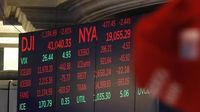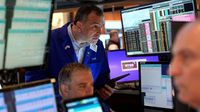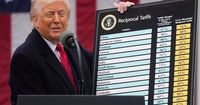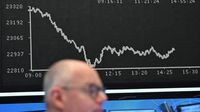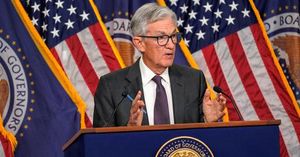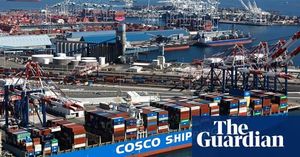Global stock markets experienced a dramatic decline on April 3, 2025, following the announcement of sweeping tariffs by U.S. President Donald Trump. The tariffs, which range from 10% to 49%, target trading partners worldwide, causing investors to panic and sell off shares. The broad S&P 500 index fell approximately 4% shortly after trading began, while the European benchmark Euro Stoxx 50 dropped nearly 3%. The markets reacted swiftly to what has been dubbed the "Day of Liberation" by Trump, who declared April 2 as the day the U.S. would confront what he described as unfair trade practices.
Trump's tariff package, announced in a ceremony at the White House, imposes a 20% surcharge on European imports and a staggering 34% on goods from China. The president accused these countries of "plundering and raping" the U.S. through their trade policies. The immediate aftermath of this announcement saw significant losses across major stock indices globally. In Germany, the Dax index fell by 2.5%, equating to a loss of nearly 41 billion euros, while the Euro Stoxx 50's decline represented a book loss of almost 140 billion euros.
In Asia, the Nikkei index dropped by 2.7%, resulting in a loss of 100 billion euros, while the Hang Seng index in Hong Kong fell by 1.52%, erasing 46 billion euros in value. Overall, the combined losses across these four major indices amounted to approximately 1.8 trillion euros, highlighting the severe impact of Trump's trade policies.
Investors reacted to the tariffs with immediate sell-offs, particularly in the tech sector, where companies like Apple saw their stock prices plummet by more than 9%. Apple's heavy reliance on Asian supply chains makes it particularly vulnerable to these tariffs. Other tech giants like Meta and Amazon also suffered, with their shares down by more than 7% each. The financial turmoil extended to traditional retail as well, with shares of companies such as Walmart and Target dropping between 3% and 7.6%. The luxury sector was not spared either, as Ralph Lauren's stock fell by 16%.
The repercussions of Trump's tariffs are expected to reverberate throughout the global economy. Economists warn that the tariffs could lead to a significant contraction in global trade, with projections indicating that U.S. imports from various countries could drop by as much as 20%. Furthermore, the Gross Domestic Product (GDP) of the U.S. is forecasted to decline by up to 0.5%, with the German economy potentially facing a similar fate.
"This is a bitter day for the global economy," remarked Lisandra Flach, a trade expert at the Munich Ifo Institute. Flach emphasized that the proposed tariff increases represent a turning point for the global economy, endangering nearly 80 years of multilateral trade agreements. The situation has sparked fears of a trade war, which could further destabilize already fragile economies.
In response to the escalating tensions, the European Union has indicated that it is preparing countermeasures, including tariffs on American products such as bourbon whiskey. Ursula von der Leyen, President of the European Commission, stressed the need for negotiations but acknowledged that the EU is finalizing its first response package to protect its interests.
Amidst the chaos, the euro gained strength against the dollar, rising by 1.67% to 1.1091 USD. This shift reflects investor sentiment regarding the stability of the U.S. economy in light of the tariffs. The volatility index, known as the VIX, reached a three-week high of 29.26 points, indicating heightened market anxiety.
The commodity markets also felt the pressure, with oil prices dropping significantly. Brent crude fell by 7% to $69.74 per barrel, while the price of copper dropped by 3.5% to $9,363 per ton. Investors seeking safe havens turned to gold, which reached an all-time high of $3,167.57 per fine ounce.
Market strategists like Elias Haddad from Brown Brothers Harriman expressed caution, stating that the heightened risk of recession or stagflation necessitates a careful approach to investments. The sentiment on Wall Street, once buoyed by hopes of corporate-friendly policies under Trump, has now turned somber as fears of a trade war loom large.
As the situation continues to unfold, the implications of Trump's tariff policy will likely dominate economic discussions in the coming weeks. With both the U.S. and European economies intertwined, the fallout from these tariffs could lead to a prolonged period of uncertainty for investors and consumers alike.
